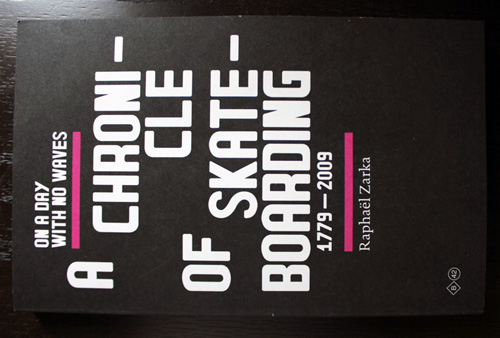
If the act of skateboarding is a universal language, then does a skateboarder need to know how to speak, let alone decipher the meaning of text? – Inquisitive Gentleman
I now leave to the magazines, to the growing number of documentaries, blogs and the internet in general, the task of completing and filling out the gaps in this project. – Raphaël Zarka
Review by Galen Dekemper
The methods of product presentation and transmission are important in a multimedia age. In 2011 one can easily curate a history of skateboarding through video clips. The writer realizes that these video relics show skateboarding to be an act unparalleled in self-containment and visual definition. Filmed video parts are mimicry far more exact than what the writer can endeavor to shape with his words. Yet as the endless amount of footage expands to the point where there is more skateboarding online than pornography, the oeuvre grows nearly as difficult to navigate as the three levels of Central Park Hubba. Still one feels compelled to attempt success in the face of likely failure. Spirited conversation and literacy prove helpful as a way of determining what’s really good. One learns to trust one’s suppliers.
To examine skateboard literature into and beyond the industry canon of magazine writing is an autodidact’s game. Superstars have penned their life tales. Someone in Texas has channeled Justin Pierce’s ghost. The occasional coffee table edition may include a worthwhile introduction. To be aware of Skateboarding, Space and the City, by Iain Borden, shows that one has reached a plateau of skateboard reading. Due to the rarity of books in comparison to other skateboard media, the appearance of a new skateboarding book merits attention. With On a Day With No Waves: A Chronicle of Skateboarding, Mr. Zarka has chosen to document skateboarding’s history in a 230 year timeline.
There is pleasure to be found in reading Zarka’s chronicle in its entirety, as history does exist and ideas emerge through connections in linear time. In George Orwell’s 1984, a misled character claims that books are good to the extent that they reinforce thoughts the reader already believed. This chronology refutes such a claim, as the book is as its best when it prompts one to look beyond its pages, to perform research of one’s own on a subject of interest, much in the way a good skate video sends one outside, firecrackering off the curb, ready to do some tricks of one’s own.





